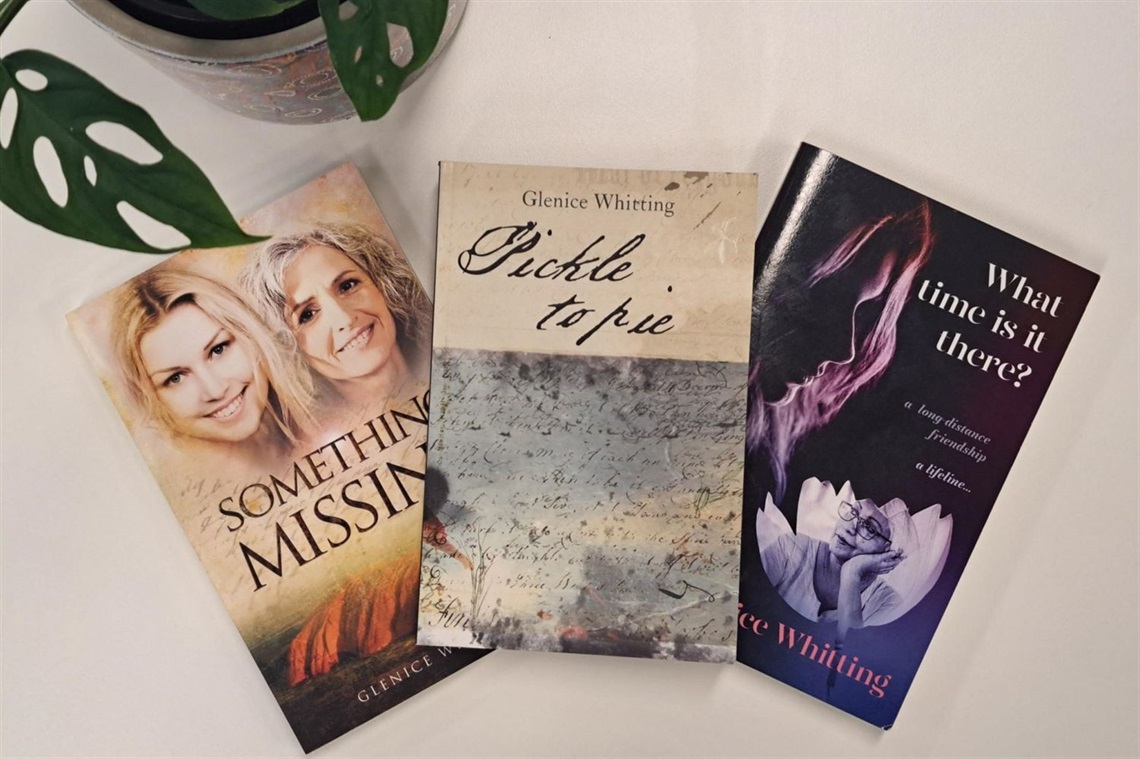How Glenice found new inspiration in old family secrets
Published on 22 November 2023

At the start of Glenice Whitting’s debut novel, Pickle to Pie, there is an abstract from Shakespeare’s comedy, As You Like It. In its entirety, Glenice chose to reproduce the character Jaques’s ‘The Seven Ages of Man’ speech, in which he compares life to a play.
“All the world’s a stage,” the speech begins, “And all the men and women merely players.”
This famous and oft-quoted speech suggests that from birth to death, every person goes through the same stages in their life’s journey from infancy to old age. Through this lens, it’s a very fitting inclusion in this novel, considering how Pickle to Pie marked the beginning of a brand-new chapter in its author Glenice’s own life.
For the first few decades of her life, AccessCare client Glenice worked as a hairdresser, until at the age of 50, she decided to go back to university and become a social worker. During this period, Glenice was to make a life-changing discovery, when she uncovered her father’s hidden German heritage.
“I never knew [about my dad’s German ancestry],” says Glenice. “He never talked about his childhood, or about growing up in a German family.” While visiting her childhood home, Glenice chanced upon a box of old postcards written in Old High German. They dated back to the late nineteenth century when, as Glenice soon discovered, her father’s family moved to Australia from Germany.
From this point on, Glenice became consumed with learning more about the German/Australian immigrant experience, and with understanding the inter-generational effects of conflicting cultures.
“I was privileged to hear all of my dad’s stories as he got older,” says Glenice, who says she was also surprised to learn that her father had changed his last name in an effort to hide his German heritage.
“After he died, I wanted to write about my father’s life, and I knew I wanted to write an historical novel about him and his ancestry.”
That novel, Pickle to Pie, was eventually shortlisted for the Victorian Premier’s Award in 2003, and was the joint winner of the Ilura Press International Fiction Quest in 2006.
This success kickstarted yet another stage of Glenice’s life, as she decided to change direction again and pursue writing professionally. She achieved first her master’s in creative writing, and then at 70 years of age, obtained her PHD.
Her second novel, Something Missing, was first published in 2016, and is based on a chance encounter she had with an older American woman in the Australian Outback more than thirty years ago, and the lifelong friendship that they nurtured from their respective corners of the world.
When her publisher eventually ended the print run of Something Missing, Glenice decided to self-publish the novel under a new name, What time is it there?, which gave her the freedom to release the novel as she had originally written it, without the editor’s changes.
“There was a lot I wanted to put back into the novel,” explains Glenice.
This affinity for writing powerful stories steeped in personal history led her to begin teaching memoir writing at Godfrey Street Community House. For five years, she helped budding writers to turn their own life events into beautiful prose.
And then, without warning, another new chapter began in Glenice’s life, when she was diagnosed with a neurodegenerative disease. Quickly and cruelly, Glenice found her speech and her ability to communicate with others was changing.
“This condition, the aphasia, it makes everything very hard. It’s impacted my storytelling, because I can’t talk about [my books], and my handwriting is affected.”
Ever the writer though, Glenice is committed to finishing the two projects she is currently working on: a non-fiction book about how Uluru has changed since she first visited in 1975, and a novel titled Died Pretty.
“It’s about an American hairdresser who has multiple affairs,” says Glenice with a coy smile.
In an effort to find a home for these books, she took both ideas to her publisher, who immediately pounced on Died Pretty.
“My editor said, ‘Multiple affairs? That’s good’,” laughs Glenice.
Glenice these days spends much of her time in her writing room, which is located on the second storey of her home in Patterson Lakes.
 “Upstairs is my sanctuary, my room with a view. I can just go up there and write."
“Upstairs is my sanctuary, my room with a view. I can just go up there and write."
When her mobility began to deteriorate as a result of her disease, Glenice found she needed support getting up the stairs to her treasured desk. As her home care provider, AccessCare was able to help arrange the installation of a stairlift to make that process much easier.
“That chair makes our life a lot better,” says Glenice, who explains that she and her husband hope to stay together in their beautiful waterside home for as long as possible. “We’ve lived here for 30 years. Now, at 85 and 82, it’s important to us [that we continue living independently at home]. This is familiar to us. We like to look out at the water and comment on it and it’s just lovely.”
To support her writing, Glenice is also part of a writer’s group, which she says is a great community for inspiration. Meeting over Zoom every Monday and Thursday, Glenice is not only able to seek feedback on the latest chapter of Died Pretty, but she can continue to share the wisdom she's honed through her memoir writing classes.
So, what is her number one bit of advice for aspiring writers?
“Be yourself,” says Glenice matter-of-factly. “That’s the common message in all of my books – be yourself. I consider myself a very truthful storyteller.”
But wait, isn’t Died Pretty about an adulterous woman?
With another smile, Glenice explains that while she was once a hairdresser like her protagonist, that’s where the autobiographical content of this book ends. As she states in Pickle to Pie’s dedication: ‘Based on fact, veiled in fiction: a melding of imagination, historical events and scattered memories.’
For Glenice, this is part of what she loves about writing: getting lost in a story and exploring ideas and topics that are at once familiar yet also rather foreign.
A key example of how well Glenice can blend fact with fiction comes from her second novel, What time is it there?. Originally, Glenice and her American friend (who was given the pseudonym Maggie in the novel) collaborated on the story; however, very sadly, Glenice’s co-writer passed away when the novel was only half finished.
Glenice was then tasked with finishing the book on her own, and made the compelling decision to – spoiler alert – write this death into the novel. All of a sudden, the ending had changed, creating a perfect life lesson that a story is never finished until that final full stop.
All of life might be a stage, but that doesn’t mean the script has already been written.
As Glenice has proven time and again, new beginnings are always just around the corner. You can plan a story (or a life) down to the final detail, but until you get going, you don’t know where the narrative might take you.
Challenges will always come your way, but in both life and literature, the key is being able to adapt to new circumstances. There’s no use wondering, “what if?” after a curveball disrupts your plan. Rather, it’s better to consider, “what now?”.
And in everything, always remember to be yourself.
Photos (from top of page to bottom):
1. Copies of Glenice's three novels, Something Missing, Pickle to Pie and What Time is it There?
2. Glenice Whitting.